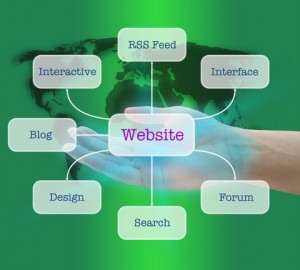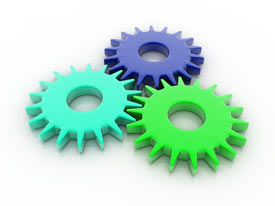 The most important piece of software you’ll need for your online business website is its content management program. The content management program controls what appears on your web page and the overall design of the website. Choosing a content management program that’s affordable, easy-to-use and versatile is an important decision.
The most important piece of software you’ll need for your online business website is its content management program. The content management program controls what appears on your web page and the overall design of the website. Choosing a content management program that’s affordable, easy-to-use and versatile is an important decision.
What is CMS?
A content management system, or CMS, is essentially a program that manages the HTML content of your website, creating, editing and storing the content in a manner that is available to be accessed and manipulated by the owner or administrator of the site. The content of your site is uploaded or created in the backend portion of the program. Once it’s been approved for public consumption, the content is then available to be viewed by visitors to your site on the front end.
The great thing about CMS programs are that they allow users with little familiarity with web programming or markup languages to manage content on their sites. While a web developer may be necessary to set up the CMS program, once it’s up and running, non-technical users can easily create, add and delete content from your business’ web page. This is good for small business owners who may not have the resources to employ full-time web developers or other technicians to manage their sites.
What Options Does A CMS Provide?
A content management system typically provides all or most of the following features for web site owners:
Automated templates – Instead of requiring the user to start from scratch each time he or she wants to add a page or a feature to the website, CMS programs create templates in HTML or XML that can be used to quickly and easily post content to your page.
Access Control – Content management systems typically divide visitors to your site into user groups. This allows the site administrator to require users to register to gain access to certain segments of the site, and gives the administrator the ability to block certain users or user groups from areas of the site.
Expansion options – Most content management systems allow administrators to expand the site over many domains and can also allow them to create web portals and mini-sites on the business’ main page.
Quick and easy editing – Perhaps the most popular feature of CMS programs is their ease of use for editing content. Using a CMS program, business owners can quickly and easily change the content of their sites. This allows them to quickly correct mistakes and avoid the costs of having a full-time web developer.
Add-ons: For business owners who feel their CMS program needs a little more horsepower, most CMS programs accept plug-ins which expand the functionality of the program.
Upgrades – Most CMS program receive regular updates from their manufacturers that help work out bugs in the system and also expand the functionality of the program.
Managing workflow and collaboration – Using a CMS program helps you guide new content through an editing process. By adjusting your settings, you can require that an employee submit a story through the system and then require an editor to sign off on it before it publishes. The program can also allow content contributors and managers to kick content back and forth to one another and other employees, allowing for easier collaboration.
Syndication – A good CMS program can help distribute material by posting to RSS and Atom feeds and automatically submitting content to other sites.
Preview – Most good CMS programs have an option that will allow you to see how the new content you’re posting will look on your site before you post it.
What To Look For in A CMS
When selecting a CMS, the key thing to look for is accessibility. Picking a content management system that has a clunky user interface, or that is slow to work or requires an excessive amount of steps to perform simple tasks kills the efficiency you can enjoy by using a CMS. Your CMS should be intuitive and easy to learn, should work at a decent rate of speed and should not frustrate users with excessive steps or a user interface that’s unforgiving of slight misteps.
Appropriateness is another key factor to consider when buying a CMS. If your site will only need a few basic features, you may not need to purchase a top-shelf CMS. In fact, some small businesses with only basic website needs may be able to use open-source, free CMS programs. However, if your site will offer a variety of complicated graphics, charts, games or other options, you may need a more upscale choice.
Reliability is another important factor to consider. If your content management system is frequently buggy, it won’t be of much use to you. Check out consumer ratings and talk to other business owners before committing to purchasing a CMS.
Here’s a final tip: Don’t let your IT guy pick your CMS program. Instead, let the employees who will actually be using the system to post content have input on the choice. The users will have a better perspective on what they need and don’t need from a CMS. Also, an IT professional will have much more technical knowledge than your average employee, so a system that seems easy to your IT guy may be a labrynth to a less tech-saavy employee.
Once You Buy It
Once you purchase a content management program, the most important thing to do is get your staff trained on the new system. By adequately training your staff, you’ll ensure that they can quickly and efficiently create, manage, add and delete content from your site. You’ll also need to establish policies concerning who is responsible for content and an editing process. An editing process is recommended as a firewall to prote









